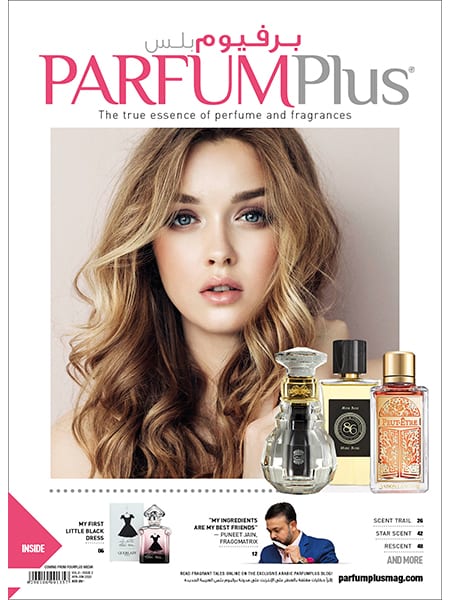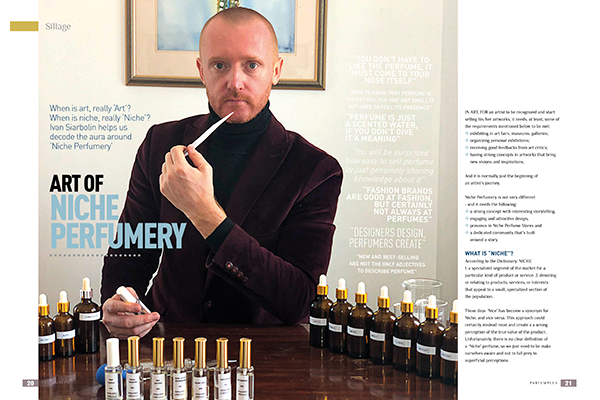
Art of Niche Perfumery
When is art, really ‘Art’? When is niche, really ‘Niche’? Ivan Siarbolin helps us decode the aura around ‘Niche Perfumery’
In art, for an artist to be recognized and start selling his/her artworks, it needs, at least, some of the requirements mentioned below to be met:
- exhibiting in art fairs, museums, galleries;
- organizing personal exhibitions;
- receiving good feedbacks from art critics;
- having strong concepts in artworks that bring new visions and inspirations.
And it is normally just the beginning of an artist's journey:
- Niche Perfumery is not very different - and it needs the following:
- a strong concept with interesting storytelling,
- engaging and attractive design,
- presence in Niche Perfume Stores and
- a dedicated community that’s built around story.
What is "Niche"?
According to the Dictionary: Niche
1. a specialized segment of the market for a particular kind of product or service. 2. denoting or relating to products, services, or interests that appeal to a small, specialized section of the population.
These days ‘Nice’ has become a synonym of Niche, and vice versa. This approach could certainly mislead most and create a a wrong perception of the true value of the product. Unfortunately, there is no clear definition of a ‘Niche’ Perfume, so we just need to be make ourselves aware and not to fall prey to superficial perceptions.
Question : "Ok, how do I know what is niche and what is not?"
Answer: " Easy"
Other than the 4 points mentioned above, what really defines a niche perfume is the ‘qualitative juice’ that’s not created based on market trends but very very clearly as a medium to make the wearer of the perfume, connect to the concept. And this connection of the wearer and the concept, signifies the real success of the juice
Let’s understand what this ‘strong brand concept’ really smells like.
Normally you would have some or all of the experiences below.
- You try perfume and guess its inspiration story. For example, you take Masque Milano (or LEN Fragrance Privarot, or any other) perfume "Tango" and after smelling, you say: "Oh, but that smells like lacquered wood (or exotic and a love spell alike, in case of Privarot), I feel passion and movement in it, I think it is about passionate dance like Tango". Voila, you hit the sweet spot, the scent is real, has a story and you felt the story.
- You look at the design and guess the brand concept. For example, you look at the bottle of an Amouage perfume and say: "It reminds me of Arabic swords and decorative handles... it feels luxurious and exuberant." Great, you nailed it! The brand was successful in transmitting the story via its packaging.
- You read the perfume’s description (what most of us don't do at all, and I totally understand why! There is a lot of crap in it sometimes) and get interesting information from it. For example, you read Xerjoff "Mamluk" description and say: "Amazing, I didn't know that Mamluk is a name of a great soldier cast in ancient Egypt that has been trained since childhood to become a warrior, I learned something new today".
These are simple examples when the perfume brand has a strong concept and the wearer is inspired, enriched and learns something new just by interacting with the perfume. This is the ‘niche’ experience.
If brand concept is the first step towards the ‘Art of Perfumery’ for a company, the Art of Perfumery for Perfumer and for Consumers are completely different stories.
Art of Perfumery for Perfumers
Perfumers create perfumes and not brands. But for ‘Fashion Brands’, to reveal this, would be taboo while ‘Niche Brands’ are more than willing to reveal the process.
Frederic Malle was probably amongst the first, if not the first, perfume brand to acknowledge the perfumers contribution, by mentioning their names on packaging and bottles. This might look like a simple gesture of appreciation for their work but it made public, many details about the industry that famous commercial brands considered as inconvenient. People started realizing that famous fashion designers are only curators or faces but not really the artists or creators of perfumes.
But to try and uncover a perfumer's journey in perfume creation would be too vast a topic for this article. But there are a few books that give you a good insight into the minds (and noses) of perfumers. Here’s a few of my favourites.
- "The Diary of a Nose: A Year in the Life of a Parfumeur" by Jean-Claude Ellena - A perfumer writes about a perfumer's journey.
- "The Perfect Scent” by Chandler Burr - A perfume critic writes about his experience in perfume brand creation.
Art of Perfumery for Consumers
With most consumers, who are already busy with their daily routine, goals, work, families, lives, they rarely have time to look into the details and they’d rather just get themselves a nice perfume that they and people around them like. Why on earth would they care about the Art of Perfumery and think about it? Why would it matter to them, if it’s niche or not?
I differ in my approach as a consumer because of the following reasons.
First of all, Niche Perfumery has a higher concentration of Naturals (Natural Oils and Fine Materials), hence the scent is more qualitative;
Second, qualitative scent will positively affect the mood;
Third, Niche Perfumes are strongly connected to storytelling and have more meaning;
Fourth, it is good for skin and health;
Fifth, it tells about special status of its wearer;
Sixth, Niche Perfume will describe your personality way better than any commercial scent with lots of nuances and varieties;
And finally, each one of us is different and Niche Perfume will highlight this.
What do I expect from Niche Perfume as a consumer :
- Creative Packaging (can be simple or luxury)
- Unique, original and interesting smell (must not smell like a copy of other perfumes)
- Lots of stories
- Average longevity (lasting too long, as well as too short, is not good)
- Higher than normal price
A niche perfume should touch deeply and give a thought and a feeling which says, "Oh, that's about me".
Niche Perfumery may look like a scary beast but only after some time do you realize how good it is. Time is certainly needed to get used to new scents, accepting something different and daring to smell unique.
On a final note, I’d like to add a note of caution because there are so many brands talking about niche. But are they all niche?
To know what’s really niche, I would advise the following:
- Ask experts and professionals;
- Visit dedicated Niche Boutiques (like Plethora, Atelier Perfumery, Villa515, Imperial Scentury, Limited Gallery and others);
- Read Perfume dedicated magazines and articles;
- Read about Fragrance Foundation Award and what Niche Brands get nominated;
- Ask friends what niche perfumes they've heard of or have experienced.
And choose the one that makes you feel.. ‘Yes, that’s about me!’.
© FourPlus media






